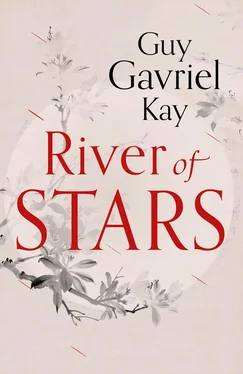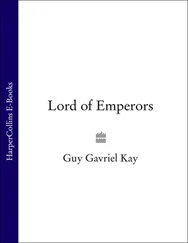She loves him, honours him, wants to protect him, wants him to be properly seen as well, even if he is happier withdrawing towards shadows. There are only the two of them in the world. Until she weds and leaves the house.
It is too easy to dismiss Lin Kuo, his daughter thinks for the hundredth time or more. Even his small book on the gardens here, presented to Master Xi today. Of course it isn’t an important work, but it is carefully, wittily done, offers observations that might last: a portrait in words of Yenling, a part of it, in these years of the dynasty under Emperor Wenzong, may he reign a thousand years upon the Dragon Throne.
It is called the Dragon Throne again. She must be tired, or overtired, her thoughts are drifting. Shan knows why it has that name once more. She has learned such things because of her father. They are there for her, in her mind. Can you unlearn ? Go back to being something else? A girl like all the others?
At their dynasty’s founding, the court sages and philosophers had decreed that one reason for the fall of the glorious Ninth had been their deviation from right behaviour—an overindulgence in the ways and symbols of women. And foremost of these had been renaming the imperial throne the Phoenix Throne.
The phoenix is the female principle, the dragon is male.
Empress Hao of the early Ninth made that change while ruling as regent for her young son, and then ruling in spite of him when he grew older and wanted—in vain—to govern in his own name.
He died, instead. It is generally believed he was poisoned. The title and decoration of the Ninth Dynasty throne was not changed back after Empress Hao herself passed to the gods. And then, at the height of that dynasty’s glory, came General An Li, accursed in Kitai and in heaven, bringing terrible rebellion.
Even after peace was finally restored, glory was never the same. Everything changed. Even the poetry. You couldn’t write or think the same way after eight years of death and savagery and all they’d lost.
The lion in the wild, wolves in the cities.
And then, years later, that diminished dynasty finally crumbled away, so that still more chaos and war came to blood-soaked Kitai, through a hundred years of brief, failed dynasties and fragmented kingdoms.
Until the Twelfth rose, their own, a new glory.
A more limited glory, mind you, with the Long Wall lost and crumbling, barbarians south of it, the Silk Roads no longer Kitai’s, the Fourteen Prefectures lost.
But they called the throne the Dragon Throne again, and told cautionary tales about ceding too much influence to women. In the palace, in the home. Women are to remain in their inner quarters, to offer no opinions on matters of … on anything, really. They dress more soberly now. No long, wide sleeves, no bright colours, low-cut gowns, intoxicating scents at court or in a garden.
Shan lives these realities, and she knows their origins: the theories and writings, disputes and interpretations. She knows the great names and their works and deeds. She’s steeped in poetry, has memorized verses from the Third and Seventh, the Ninth, before and after the rebellion.
Some lines were remembered through everything that happened.
But who knew what words or deeds would last? Who made these decisions? Was surviving down the years a matter of accident as much as excellence?
She stands by the desk and lamp, suddenly weary, without even the energy to cross the room and close the door the servant has left ajar. It has been an intense day.
She is seventeen, and will be wed next year. She doesn’t think (though she might be wrong) that either of the men here fully grasped her father’s careful choice of a husband for her from the imperial clan.
A daughter-in-law in Kitai is the servant of her husband’s parents. She leaves her home and becomes a lesser figure in theirs. The parents can even send her back (and keep her dowry) if she is judged insufficiently respectful. Her father has spared her that, knowing what she is (what he has caused her to be).
The imperial clan have all the servants any of them will ever need, paid for by the court office that administers the clan. They have doctors assigned, and entertainers and alchemists and cooks. Astrologers, though only by daylight and with permission. They have sedan chairs, single or double, at their disposal when they wish to (again with permission) leave the compound by the palace, where they are expected to live forever.
There are funds for formal clothing and adornments for banquets or ceremonies when their presence is required. They are creatures to be displayed, symbols of the dynasty. They are buried in the clan graveyard—which is here in Yenling. There isn’t enough room in Hanjin. From one graveyard to another, someone had once said.
A woman marrying into the clan lives a different life. And it can be a good life, depending on the woman, on her husband, on the will of heaven.
She will have a husband, less than a year from now. She has met him. That, too, is unusual, though not forbidden—and such matters are conducted differently within the imperial clan. Her father’s jinshi degree, his status as a court gentleman, had given more than enough stature for him to address, through intermediaries, a family in the clan. Marrying into the imperial ranks isn’t universally desired. It is such a sequestered life, shaped by ceremony and regulation, so many living so closely together as their numbers grow.
But for Shan it offers a promise of sorts. Among these people, already marked apart, her own differences might blend, silk threads weaving with each other. It is possible.
And Wai—Qi Wai—is a student himself, her father had determined. A little different, too, it seems. A man (a boy, still, really) who has already travelled (with permission) to search out ancient steles and bronzes in the countryside, and brought them home to catalogue.
This wasn’t your usual son of the indolent imperial clan, pursuing wine and pleasure in the entertainment districts of Hanjin because there was no ambition possible for him. Sometimes, perhaps out of boredom as much as anything, some of them drifted into intrigues against the throne. They were executed for that.
Qi Wai had been stiff but courteous, sitting with his mother and her aunt on the one occasion they were together, taking tea, after the first negotiations had proceeded satisfactorily. Her father had made it clear to her (and to them, she believed): in his view the marriage turned on the two young people finding or anticipating an affinity.
Shan thought they had, at least potentially, that day.
He’d looked younger than her (was a year older). He was plump, had the wispy beginnings of a scholar’s chin beard. The attempt at dignity that implied was amusing at first, then endearing. He had small, smooth hands. His voice was low but clear. He’d be feeling shy, too, she remembers thinking.
She had taken pains with her appearance, which she didn’t always do, but her father had worked hard and carefully to arrange this meeting, and he deserved that much of her. Besides, it was all interesting . She’d worn blue liao silk in a sober cut, gold-and-lapis-lazuli hairpins. Her lapis earrings, too. They had been her mother’s.
She allowed Wai to see her mind working as they talked. He’d know about her eccentric education by now, but she didn’t push forward her manner of thinking the way she sometimes did, to provoke a response.
He spoke—this man, Qi Wai, who would, apparently, be her husband—of a rare Fifth Dynasty stele he’d found north of the capital, close to the border with the Xiaolu. She wondered if he had been trying to impress her with his bravery going up there, then decided he didn’t think that way. There was a long-established peace, trade, a treaty. He’d gone to where he’d heard there were antiquities to be found. The border hadn’t entered his mind.
Читать дальше












